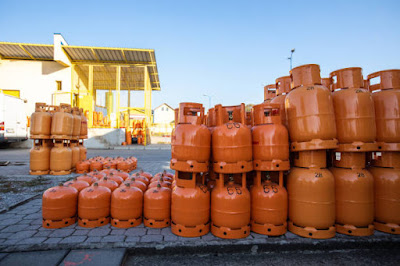Dangote Refinery Begins Fuel Exports, Signaling Potential Shake-Up in Regional Markets
A tanker, the CL Jane Austen, has transported over 300,000 barrels of petrol from Nigeria’s newly commissioned Dangote Refinery to waters off the coast of Togo, marking a significant milestone in the refinery's early operations. The shipment, while small in comparison to the global fuel market, hints at the refinery’s potential to disrupt regional fuel dynamics.
A Sign of Growing Operations
The tanker loaded its cargo at the Dangote facility and sailed west, as reported by ship-tracking platforms Vortexa, Kpler, and Precise Intelligence, as well as a port report compiled by Bloomberg. Currently anchored off the coast of Lome, a popular spot for ship-to-ship (STS) transfers, the fuel could either be stored or redirected to other markets.
Last month, the refinery shipped its first seaborne petrol cargo to Lagos, signaling the start of its integration into domestic and regional markets. While it remains unclear how much of Dangote’s petrol output will eventually be exported, this shipment suggests the refinery is ramping up production and positioning itself as a regional supplier.
Implications for Regional Markets
The refinery’s exports have attracted attention from neighboring African countries. Reports indicate that eight African nations, including Ghana, Benin Republic, Togo, and South Africa, are likely to source petroleum products from the Dangote Refinery. For these nations, importing from Nigeria offers advantages such as reduced shipping costs and lowered pressure on foreign exchange reserves.
For instance, Ghana’s chief oil regulator, Mustapha Abdul-Hamid, recently stated that importing from Dangote could replace imports from distant markets like Rotterdam. This would help Ghana cut freight costs and reduce the overall price of petroleum products in the country.
“If the refinery reaches 650,000 bpd capacity, Nigeria alone cannot consume all that volume. It will be easier and more economical for us to import from Nigeria, which will help lower our prices,” Abdul-Hamid explained.
Potential for Regional Transformation
The Dangote Refinery, built at a cost of $20 billion, is Africa’s largest private refinery and one of the largest globally. With a processing capacity of 650,000 barrels per day, it is poised to drastically reduce Nigeria’s reliance on imported petroleum products, addressing a long-standing infrastructure gap in the country’s oil sector.
Despite being Africa’s largest oil producer, Nigeria imports nearly all its fuel due to inadequate refining capacity. The Dangote Refinery aims to change that narrative by supplying high-quality petrol and diesel both domestically and across the region.
What’s Next?
While the refinery’s export potential is promising, questions remain:
Domestic Market: Following the Nigerian government’s decision to end the state-owned NNPC’s monopoly on purchasing fuel from the refinery, it remains to be seen how much of Dangote’s output will stay within Nigeria to meet local demand.
Global Reach: The current shipment's final destination is uncertain. The fuel could be sold in Togo, stored, or redirected through STS transfers to other countries.
Full Operational Status: With full operations expected to begin either this year or in 2025, the refinery’s long-term impact on Africa’s fuel market will depend on how effectively it scales production and integrates into regional supply chains.
Key Takeaways
Market Leader: Once fully operational, the Dangote Refinery will be the largest refinery in both Africa and Europe.
Economic Impact: The refinery could significantly reduce Nigeria’s fuel import bill, strengthen its economy, and position it as a key exporter of petroleum products in the region.
Strategic Importance: Neighboring countries are eyeing Dangote’s output as a cost-effective alternative to imports from Europe and the U.S., potentially transforming the regional fuel market.
The CL Jane Austen’s journey may be just the start of a new era in Africa’s fuel supply dynamics, with the Dangote Refinery at the center of the transformation.






![Gospel Music: Halima YK – My Life Is Better (Prod. by Balele) [MP3 Download]](https://blogger.googleusercontent.com/img/b/R29vZ2xl/AVvXsEhe8oYG5TEr4RJ7fgbYi5rJ2ibNLmzcbSBHE6asWAk_Ok6LQaY1XXGddzNSALxhOq5iiF8BiY700JGJNai0XzKoRvvRZpRuUgmRSiU0uiMjE0S3c5nweceTof9hVRfJWhnmbQmRb0KPU0feITk3m4niD7zh-3HRuC6T17QffYWrxOA2CzRfYyFuB_BVmfs/w72-h72-p-k-no-nu/IMG-20250404-WA0003.jpg)
![Download: Yakare - Mandiyata Mark – Powerful Gospel Song (Prod. by Gmark) [MP3 Download]](https://blogger.googleusercontent.com/img/b/R29vZ2xl/AVvXsEhrKOlOkAUrCSyWt8coMs-v4u4dMBZ0YtEqkh9UdePLByl79gZnfvrpT1WvcDE5d97khl7AWwuzPkQWsF3sFFpYr94wdFS-cPeZvdnUZ5rSCVWjq9M7zUWdKE8XhpCiBCBv7k14m1d__WtOgSccmJLbwXN6ZwDkD3hZbWU4tHR09ihkAySqpMFbAwCF1Zk/w72-h72-p-k-no-nu/20250328_222024-01.jpg)












0 Comments